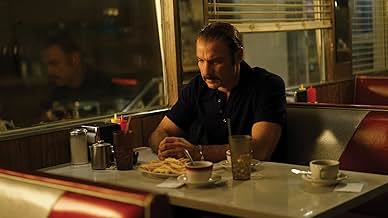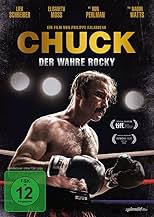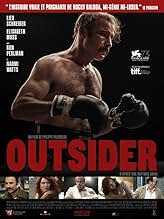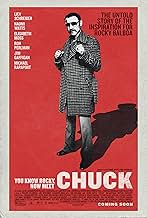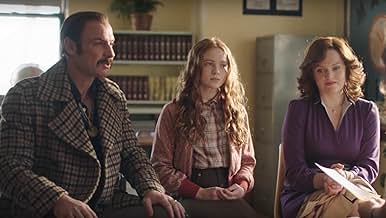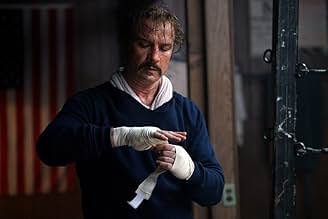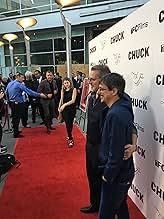VALUTAZIONE IMDb
6,5/10
7236
LA TUA VALUTAZIONE
La storia, che ha ispirato il film Rocky (1976), del peso massimo Chuck Wepner, che ebbe l'occasione di un incontro di boxe con il campione Mohammed Ali.La storia, che ha ispirato il film Rocky (1976), del peso massimo Chuck Wepner, che ebbe l'occasione di un incontro di boxe con il campione Mohammed Ali.La storia, che ha ispirato il film Rocky (1976), del peso massimo Chuck Wepner, che ebbe l'occasione di un incontro di boxe con il campione Mohammed Ali.
- Regia
- Sceneggiatura
- Star
Recensioni in evidenza
Greetings again from the darkness. "That guy could take a punch." It's supposed to be a compliment and knowing nod to the machismo and toughness so valued in the world of boxing. Instead that trait is responsible for the two claims to fame for heavyweight boxer Chuck Wepner: he shockingly went 15 rounds (minus 17 seconds) against Muhammad Ali in 1975, and was the inspiration for Sylvester Stallone's Oscar winning movie Rocky.
Director Philippe Falardeau (Monsieur Lazhar) and the four co-writers (Jeff Feuerzeig, Jerry Stahl, Michael Cristopher, Liev Schreiber) spend very little time in the boxing ring or with the usual training montages, and instead focus on how Wepner's ego and inability to handle fame affected his family, his health and his life. This is a portrait of Chuck the man, and it's at times more painful than the barrage of punches Ali landed in Round 15.
Liev Schreiber is outstanding as 'The Bayonne Bleeder', the disparaging (but accurate) sobriquet that stuck with Wepner – thanks to his propensity to bleed in most bouts. His self-motivation to "Stay up Chuck" against Ali (played here by Schreiber's "Ray Donovan" brother Pooch Hall) is what became the foundation for Stallone's Rocky screenplay. There are a few terrific scenes with Wepner and Stallone (a spot on Morgan Spector) as Wepner desperately tries to latch onto the Rocky bandwagon, going so far as to introduce himself as "the real Rocky". It's tough for an actor to get Oscar consideration for a performance in the first half of the year, but Schreiber is worthy.
It's not the first time we have seen the pitfalls of instant fame and celebrity status, and even though it's a true story, there is a familiarity to it that makes the plight of this lovable lug quite easy to relate to. Wepner's blue collar narcissism may have been the cause of much of the pain in his life, but it also allowed him to become a folk hero. His connection with Anthony Quinn in Requiem for a Heavyweight provides all the personality profile we require to grasp Wepner's make-up.
The supporting cast is strong. Ron Perlman plays Wepner's manager/trainer Al Braverman, Jim Gaffigan is his hero-worshiping corner man and cocaine accomplice, Elisabeth Moss plays wrongly-done first wife Phyllis, Michael Rappaport is estranged brother John, and Naomi Watts (she and Schreiber ended their long-term relationship soon after filming) as his confidant and second wife Linda. Moss and Rappaport each have very strong scenes scenes that remind us that these are real people and not part of some fairy tale.
Director Falardeau delivers no shortage of 1970's cheese – wardrobe, facial hair, disco music, party drugs, and night clubs – but there is also enough humor to maintain balance: Wepner explains after the Ali fight how he tried to "wear him down with my face". By the end we aren't sure if Wepner was self-destructive or simply lacking in dependable counsel. Either way, the journey of self-discovery is even more interesting than the boxing career, and the film is punctuated with closing credit footage that provides viewers with a sense of relief. A tragic ending has been averted, and Chuck remains a local Bayonne, New Jersey resident – even if he's no longer a bleeder.
Director Philippe Falardeau (Monsieur Lazhar) and the four co-writers (Jeff Feuerzeig, Jerry Stahl, Michael Cristopher, Liev Schreiber) spend very little time in the boxing ring or with the usual training montages, and instead focus on how Wepner's ego and inability to handle fame affected his family, his health and his life. This is a portrait of Chuck the man, and it's at times more painful than the barrage of punches Ali landed in Round 15.
Liev Schreiber is outstanding as 'The Bayonne Bleeder', the disparaging (but accurate) sobriquet that stuck with Wepner – thanks to his propensity to bleed in most bouts. His self-motivation to "Stay up Chuck" against Ali (played here by Schreiber's "Ray Donovan" brother Pooch Hall) is what became the foundation for Stallone's Rocky screenplay. There are a few terrific scenes with Wepner and Stallone (a spot on Morgan Spector) as Wepner desperately tries to latch onto the Rocky bandwagon, going so far as to introduce himself as "the real Rocky". It's tough for an actor to get Oscar consideration for a performance in the first half of the year, but Schreiber is worthy.
It's not the first time we have seen the pitfalls of instant fame and celebrity status, and even though it's a true story, there is a familiarity to it that makes the plight of this lovable lug quite easy to relate to. Wepner's blue collar narcissism may have been the cause of much of the pain in his life, but it also allowed him to become a folk hero. His connection with Anthony Quinn in Requiem for a Heavyweight provides all the personality profile we require to grasp Wepner's make-up.
The supporting cast is strong. Ron Perlman plays Wepner's manager/trainer Al Braverman, Jim Gaffigan is his hero-worshiping corner man and cocaine accomplice, Elisabeth Moss plays wrongly-done first wife Phyllis, Michael Rappaport is estranged brother John, and Naomi Watts (she and Schreiber ended their long-term relationship soon after filming) as his confidant and second wife Linda. Moss and Rappaport each have very strong scenes scenes that remind us that these are real people and not part of some fairy tale.
Director Falardeau delivers no shortage of 1970's cheese – wardrobe, facial hair, disco music, party drugs, and night clubs – but there is also enough humor to maintain balance: Wepner explains after the Ali fight how he tried to "wear him down with my face". By the end we aren't sure if Wepner was self-destructive or simply lacking in dependable counsel. Either way, the journey of self-discovery is even more interesting than the boxing career, and the film is punctuated with closing credit footage that provides viewers with a sense of relief. A tragic ending has been averted, and Chuck remains a local Bayonne, New Jersey resident – even if he's no longer a bleeder.
Sylvester Stallone has denied that his character of Rocky Balboa was inspired by heavyweight boxer Chuck Wepner, who fought professionally from 1964 to 1978. Well, let's just take a look at some of what happens in the "Rocky" movies, shall we? In the original "Rocky" (1976), an unknown white boxer was plucked from obscurity and given a shot at the heavyweight title by a flamboyant black champion. No one gave Chuck, er, I mean, no one gave "Rocky" much of a chance, but he trained hard (old-school) and greatly exceeded expectations during the fight. In "Rocky III" (1982), Rocky gets in the boxing ring for a match against a hulking professional wrestler and, at one point, the wrestler picks Rocky up and drops him to the ground outside the ropes. In "Rocky IV" (1985), Rocky watched James Brown sing from inside the ring before a match. In the career of what real life boxer did all those things happen? Chuck Wepner. Who wrote and starred in all six "Rocky" movies? Sylvester Stallone. It's no wonder that Wepner called himself "the real Rocky". Likewise, it's no wonder that the bio-pic dramedy "Chuck" (R, 1:38) was made to tell Wepner's story. I could say more about the details in common between the careers of Rocky and Chuck, but trying to avoid spoilers (in case you don't know Chuck's story), I'll just refer you to something Chuck says in the movie: "You don't know me. Well, you know me, but you don't know you know me." It's worth mentioning up front that this isn't the story of the making of "Rocky". "Chuck" is about Chuck. The release of "Rocky" changed Chuck's life, but he was the same person before, during and after his proverbial 15 minutes of fame. Chuck worked as a liquor distributor to pay the bills. He was a boxer because it was what he did best. He wasn't the quickest, strongest or most successful heavyweight of his day, but he could take a punch. In fact, he could take a whole lot of punches (a beating, really) and keep coming back for more. They called him the Bayonne Bleeder. He hated the name, but he loved the fame. Chuck enjoyed being recognized and treated special – especially by the ladies. Never mind that he had a devoted wife, Phyliss (Elisabeth Moss), and a loving daughter, Kimberly (Sadie Sink), back home
growing increasingly frustrated by the selfish and neglectful way that Chuck was treating them.
Chuck's life changed forever in 1975. After Muhammad Ali took the world heavyweight title from George Foreman in the fight known as "the Rumble in the Jungle", Ali said he wanted to fight "a white guy". Since Chuck was the only white guy among the top 10 ranked heavyweight boxers in the world, his manager (Ron Perlman) took care of the details and Chuck Wepner, little known outside of New Jersey, got a shot at the title. For this first time in his career, he trained full time for this fight which took place near Cleveland, OH. Chuck's performance against Ali (Pooch Hall) increased his celebrity greatly. Then he became even more famous the following year when the new movie "Rocky" seemed to mirror his life, especially regarding the Ali fight. As Chuck tried to take advantage of being the guy who inspired the 1976 Best Picture Oscar winner by reaching out to Sylvester Stallone himself, Chuck was also increasing his selfish behaviors, using cocaine and pursuing even more women, including a local bartender named Linda (Naomi Watts), who didn't want anything to do with him a sentiment now shared by Phyliss.
"Chuck" is a very entertaining and long-overdue movie. Chuck Wepner's story is indeed the stuff of Hollywood – in the "Rocky" movies – and in this movie which reveals Chuck's story to be as interesting as Rocky's. This film had four writers whose combined efforts really do the story justice. They are Jeff Feuerzeig (known mainly for writing and directing documentaries including "The Real Rocky" for ESPN), Jerry Stahl (mainly a TV show writer, he also wrote 2003's "Bad Boys II"), Michael Cristofer ("Original Sin", "Bonfire of the Vanities", "The Witches of Eastwick") and Live Schreiber, who, besides being the film's star and co-writer, also helped produce. The screenplay focuses on the drama, but has an effective and organic humor about it. In the hands of director Philippe Falardeau (who directed Reese Witherspoon's 2014 film "The Good Lie"), and in the practically perfect performance of Schreiber, this film portrays the most eventful decade of Chuck's life without judgment, showing his highs and his lows, and never loses sight of his humanity. Another quote from the movie sums it up nicely: "Sometimes life is like a movie. And sometimes it's better." This film is better than most. "A-"
Chuck's life changed forever in 1975. After Muhammad Ali took the world heavyweight title from George Foreman in the fight known as "the Rumble in the Jungle", Ali said he wanted to fight "a white guy". Since Chuck was the only white guy among the top 10 ranked heavyweight boxers in the world, his manager (Ron Perlman) took care of the details and Chuck Wepner, little known outside of New Jersey, got a shot at the title. For this first time in his career, he trained full time for this fight which took place near Cleveland, OH. Chuck's performance against Ali (Pooch Hall) increased his celebrity greatly. Then he became even more famous the following year when the new movie "Rocky" seemed to mirror his life, especially regarding the Ali fight. As Chuck tried to take advantage of being the guy who inspired the 1976 Best Picture Oscar winner by reaching out to Sylvester Stallone himself, Chuck was also increasing his selfish behaviors, using cocaine and pursuing even more women, including a local bartender named Linda (Naomi Watts), who didn't want anything to do with him a sentiment now shared by Phyliss.
"Chuck" is a very entertaining and long-overdue movie. Chuck Wepner's story is indeed the stuff of Hollywood – in the "Rocky" movies – and in this movie which reveals Chuck's story to be as interesting as Rocky's. This film had four writers whose combined efforts really do the story justice. They are Jeff Feuerzeig (known mainly for writing and directing documentaries including "The Real Rocky" for ESPN), Jerry Stahl (mainly a TV show writer, he also wrote 2003's "Bad Boys II"), Michael Cristofer ("Original Sin", "Bonfire of the Vanities", "The Witches of Eastwick") and Live Schreiber, who, besides being the film's star and co-writer, also helped produce. The screenplay focuses on the drama, but has an effective and organic humor about it. In the hands of director Philippe Falardeau (who directed Reese Witherspoon's 2014 film "The Good Lie"), and in the practically perfect performance of Schreiber, this film portrays the most eventful decade of Chuck's life without judgment, showing his highs and his lows, and never loses sight of his humanity. Another quote from the movie sums it up nicely: "Sometimes life is like a movie. And sometimes it's better." This film is better than most. "A-"
Well here's the thing, the movie is good and interesting. Started out very well, with a great vibe just like most things. It has a lesson to teach about life's ups and downs. It's funny and doesn't get too boring to watch. The way they combined the story of the real guy and the acting was wonderful that you find it hard to believe that is was acting and not real. Very nice movie, but just one problem for me is the lead character, he's kind of conflicted. He appears as a reticent guy but very talkative.
Liev Schreiber gives a great performance as Chuck Wepner. He actually makes Chuck look like a wayward but charming kid. 'The Bayonne Bleeder' so called because he easily got cut, managed to land a title shot with Muhammad Ali in 1975 as Ali wanted to fight a top white contender.
Wepner then found fame of sorts later as Sylvester Stallone supposedly based Rocky on Wepner. A nobody who lands a world title shot.
After the fight with Ali, Chuck's life spirals downwards with drugs, booze and partying. His wife (Elisabeth Moss) unhappy with his womanising finally has enough and leaves him. Chuck hits rock bottom when he is set up for a drug bust.
You get the feeling once the Ali fight is done with, the film is over. After that it really is Chuck acting stupid and immature. A story that applies to hundreds of boxers.
Director Philippe Falardeau gives this film a strong period setting, he also brings out good performances from the actors that includes Ron Perlman and Naomi Watts.
Wepner then found fame of sorts later as Sylvester Stallone supposedly based Rocky on Wepner. A nobody who lands a world title shot.
After the fight with Ali, Chuck's life spirals downwards with drugs, booze and partying. His wife (Elisabeth Moss) unhappy with his womanising finally has enough and leaves him. Chuck hits rock bottom when he is set up for a drug bust.
You get the feeling once the Ali fight is done with, the film is over. After that it really is Chuck acting stupid and immature. A story that applies to hundreds of boxers.
Director Philippe Falardeau gives this film a strong period setting, he also brings out good performances from the actors that includes Ron Perlman and Naomi Watts.
Always good to see Ray Donovan and never more so than in this true story that inspired the Rocky movies.
Well put together movie with a well time narration throughout, they done a great job with setting this film in the 70's
Nice easy watch and very well filmed I thought the narration worked perfect with what was happening, solid acting and a good choice of cast,
I found the story really interesting even though I know the outcome of the Ali fight I was still cheering Chuck on.
Well put together movie with a well time narration throughout, they done a great job with setting this film in the 70's
Nice easy watch and very well filmed I thought the narration worked perfect with what was happening, solid acting and a good choice of cast,
I found the story really interesting even though I know the outcome of the Ali fight I was still cheering Chuck on.
Lo sapevi?
- QuizChristina Hendricks was cast alongside Naomi Watts and Liev Schreiber back in 2011 when the project was announced. Hendricks dropped out while the film was stuck in development and eventually Elisabeth Moss replaced her.
- BlooperChuck Wepner served his prison time in East Jersey State Prison in Rahway, NJ, not Northern State Prison in Newark, NJ, as depicted in the movie. This is where he met Sylvester Stallone while filming "Lock Up" in 1989.
- Citazioni
Chuck Wepner: What good was backing up gonna do? Look, my thing was this: I couldn't hit him, so I figured I'd wear him down with my face. It was working great for five or six rounds...
- ConnessioniFeatured in The Cine-Masochist: CHUCK WEPNER VS ROCKY BALBOA (2021)
I più visti
Accedi per valutare e creare un elenco di titoli salvati per ottenere consigli personalizzati
- How long is Chuck?Powered by Alexa
Dettagli
Botteghino
- Lordo Stati Uniti e Canada
- 320.725 USD
- Fine settimana di apertura Stati Uniti e Canada
- 34.565 USD
- 7 mag 2017
- Lordo in tutto il mondo
- 502.518 USD
- Tempo di esecuzione1 ora 38 minuti
- Proporzioni
- 1.85 : 1
Contribuisci a questa pagina
Suggerisci una modifica o aggiungi i contenuti mancanti




